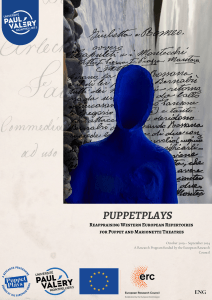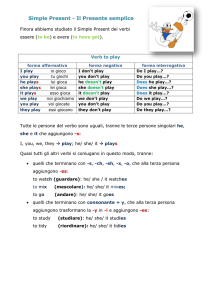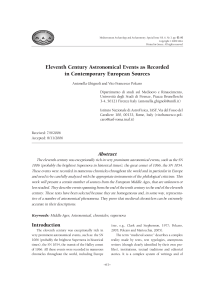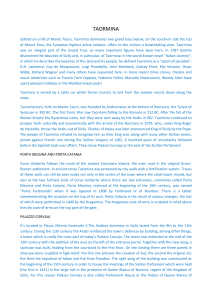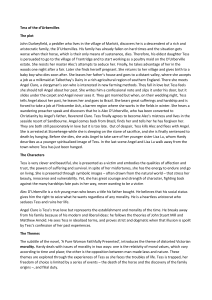caricato da
Fililati
Medieval Theatre: Mystery, Miracle, Morality Lesson
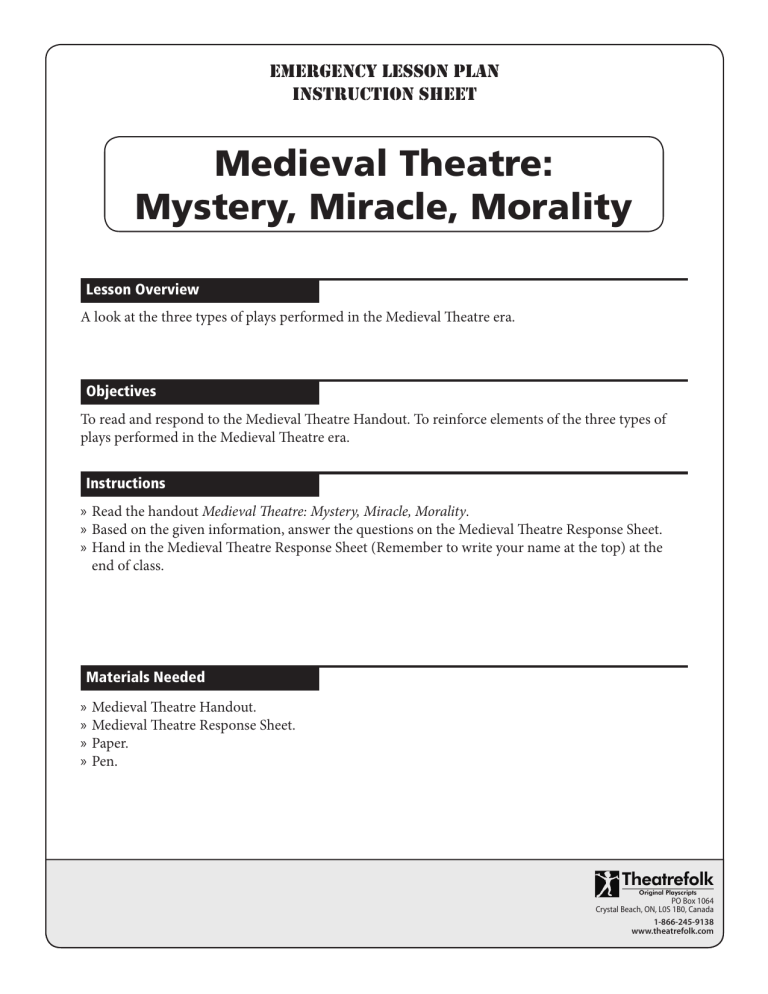
Emergency Lesson Plan Instruction Sheet Medieval Theatre: Mystery, Miracle, Morality Lesson Overview A look at the three types of plays performed in the Medieval Theatre era. Objectives To read and respond to the Medieval Theatre Handout. To reinforce elements of the three types of plays performed in the Medieval Theatre era. Instructions »» Read the handout Medieval Theatre: Mystery, Miracle, Morality. »» Based on the given information, answer the questions on the Medieval Theatre Response Sheet. »» Hand in the Medieval Theatre Response Sheet (Remember to write your name at the top) at the end of class. Materials Needed »» Medieval Theatre Handout. »» Medieval Theatre Response Sheet. »» Paper. »» Pen. Theatrefolk Original Playscripts PO Box 1064 Crystal Beach, ON, L0S 1B0, Canada 1-866-245-9138 www.theatrefolk.com Medieval Theatre: Mystery, Miracle, Morality • The Last Supper • The Resurrection In England, Mystery Plays were performed on pageant wagons. Each wagon held a different story and moved from location to location around the town. Each wagon was also the responsibility of a different trade guild (such as bakers, blacksmiths, carpenters, and plasterers.) The guild produced the play, took care of the wagon, built the sets, and made the costumes. Guilds often received stories Three types of plays grew out of the Medieval related to their craft. period: Mystery, Miracle, and Morality. All three • The shipwrights performed Noah's Ark. flourished in different areas of Britain and Europe • The goldsmiths performed the Three Wise and yet each had a short life. In England, for Men. example, the plays were either changed or banned as Protestantism came into power. • The shepherds performed The Nativity. Mystery Plays Were the plays always serious? Mystery Plays were based on scenes and stories There is a misconception that Mystery Plays, from The Bible and were often performed because of their origin and subject matter, were together in a series called a cycle. Depending on dour and serious. Certainly some were. But as they the cycle, the series could take all day, or span moved away from the church's control, the more multiple days. There are four intact cycles that secular they became, and elements of humour remain from the era: Wakefield, York, Chester, and found their way through. For example, in The N-town. The Wakefield Cycle was the most comedic Second Shepherd’s Play, a shepherd and his wife and irreverent of the four, often mentioning steal a sheep and try to hide it for comic effect. contemporary events. Chester was the most faithful They pretend the sheep is their newborn son. to the religious nature of the original stories. In the N-town Cycle, N stands for the Latin word “nomen” Even in the Medieval era, theatre had to relate to which means name. Any town could use their own its audience. The Medieval audience could not read name for that cycle. Cycles could range from the or write. For the most part they were blue collar Fall of the Angels to Judgement Day. A common working men and women. In order for the plays theme of Mystery Plays was to show a fall, then to connect to the audience, they had to speak the Redemption. Story examples include: language of the audience, have modern references, and feature characters who were familiar to their • Adam and Eve audience. • Abraham and Isaac Theatrefolk Original Playscripts PO Box 1064 Crystal Beach, ON, L0S 1B0, Canada 1-866-245-9138 www.theatrefolk.com Medieval Theatre: Mystery, Miracle, Morality The Origin of the term Mystery Play Morality Play represents all humanity: Everyman, Mankind, Humanum Genus. The theme of every There are a number of different views as to how Morality Play dealt with the struggle for salvation Mystery Plays came to be called such. – What can man do to be a Christian and save his • The word mystery also means “religious soul? The main character must make a conscious decision against temptation to be saved, thus truth.” showing the free will of man. It's the universal • From the French mystère, meaning secret. battle between good and evil. Vice versus virtue. Which will mankind choose? • That it has to do with the trade guilds who performed the plays. Craftspeople were Morality Plays used allegory. Allegory is often seen called misterium. in Medieval Drama, where a message or meaning is expressed through symbolic representation: ideas Miracle Plays and values, vices and virtues become personified. The Miracle Plays were some of the earliest in Some examples: the character of Knowledge the era, developing during the 12th century. In in Everyman, The Seven Deadly Sins in The Castle some areas the terms Miracle and Mystery are of Perseverance, Mercy and Mischief in Mankind. interchangeable when describing Medieval drama, As with Mystery Plays, it's easy to assume that particularly in reference to English plays. But Morality Plays are serious from beginning to end. true Miracle Plays have their own focus. Instead Many used humour to tell their story. The main of Bible stories, they dramatized the lives, the character in Everyman has to find a companion to legends and miracles of Roman Catholic saints. go with him to God. His cousin explains he can't This type of religious drama flourished in France go because he has a cramp in his toe… • with writers such as Jean Bodel and Rutebeuf. Some of the saints most typically portrayed were the Virgin Mary, St. George, and St. Nicholas. Few examples exist today. Miracle Plays were eventually banned in England because of their Roman Catholic leanings. Morality Plays Continuing the development of Medieval Drama, Morality Plays emerged during the 15th century. The Castle of Perseverance is often described as the first and most complete Morality Play while Everyman is the best known. Morality Plays differ from Mystery and Miracle in that they focused neither on The Bible nor the saints but on the common man. The main character in a Theatrefolk Original Playscripts PO Box 1064 Crystal Beach, ON, L0S 1B0, Canada 1-866-245-9138 www.theatrefolk.com Medieval Theatre Response Sheet Use the back if necessary. Name:_________________________________ 1. How many Mystery Cycles remain intact to this day? What are their names? 2. What was the name of the first Morality Play? 3. What does allegory mean? 4. Name two examples of Bible stories used in Mystery Plays. 5. How were Mystery Plays performed? 6. Who produced the Mystery Plays? 7. What is the definition of a Miracle Play? 8. Where did Miracle Plays flourish? 9. Name two writers of Miracle Plays. 10. What is the best known Morality Play? 11. Who is the main character in every Morality Play. 12. What is the main theme in a Morality Play? 13. What is one possible origin for term Mystery Play? 14. Give an example of an allegorical character. 15. What does nomen mean? 16. Why were Miracle Plays eventually banned in England? 17. True or False? Mystery Plays were always serious. Explain your answer. Theatrefolk Original Playscripts PO Box 1064 Crystal Beach, ON, L0S 1B0, Canada 1-866-245-9138 www.theatrefolk.com
